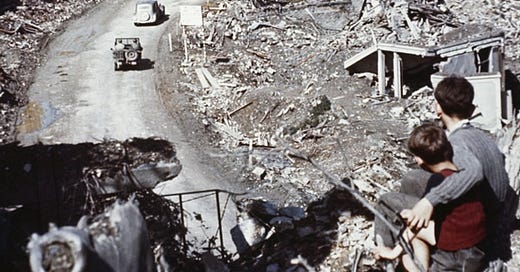Here’s a thing for this holiday season… Did you know it is possible to gift a paid subscription to one of your favourite people? Click below to give them a month, or a whole year of historical content they might not otherwise be able to fund 😌 (You can gift anonymously, and you can even schedule the email notification message from you to drop in their inbox on Christmas Day)
Last week in America I got hold of a small book by the notable historian John Keegan, which examines the historiography of the Second World War and how it has shaped our understanding of the conflict. It’s thirty years old now, but I thought it would be interesting to delve into The Battle for History: Re-fighting the Second World War, to see what he had to say about the first fifty years of constructing its history, and what it tells us about how to be better historians…
This is what his publisher had to say at the time:
Although fifty years have passed since the end of World War Il, there has as yet been no definitive history of that conflict. Existing histories have raised as many questions as they answer: Did President Roosevelt have foreknowledge of the Japanese attack on Pearl Harbour? Could the Allies have invaded France before 1944? Might bombing the Auschwitz railroad have impeded the course of the Holocaust?
Now one of our most esteemed military historians assesses the literature that has emerged from World War II and the controversies that have arisen from that literature, in a book that combines stunning erudition with crisp prose and highly personal discernment. In The Battle for History John Keegan evaluates works that range from general histories to biographies of the war's principal figures, from accounts of individual campaigns to studies of espionage and resistance. What emerges is not just an essential guide for any serious student of World War Il but also the fascinating story of the ways in which the war has been refought by two generations of its chroniclers, as told by one of the greatest of them all.
Writing history is a minefield. A gap in our knowledge is better than filling that gap with faulty information, and Keegan started this book by looking at controversies about the Second World War. Some of them are blatantly mad and you can throw them on the f*ckety-bye pile straight away. One that he picked out were David Irving’s claim that Hitler had no idea what was happening to Europe’s Jews and minorities thanks to the Final Solution. In 1995, Irving was still offering a cash reward to anyone who could find a document authorising it that was signed by Adolf. As for James Bacque, Keegan describes his principle theory as ‘crackpot.’ He apparently claimed that Eisenhower was responsible for the deaths of millions of prisoners of war at the end of the conflict, but this had been overtaken by facts and logic by the mid-90s, and Keegan remarked that ‘since the publication of the papers of a scholarly conference exploded for good and all the substance of his delusion, has sensibly kept quiet.’
The historian he wrote about in the most detail, though, is concerning, because you will still see many a book by A.J.P. Taylor lurking on shelves in second-hand bookshops. For those who don’t know the name, Alan John Percivale Taylor (1906 - 1990) was a British historian who became a household name by giving lectures on TV. He was renowned for his ‘academic rigour’ and in a 2011 poll by History Today magazine, he ranked fourth in a list of the most important historians of the last 60 years. So you can trust everything he says, right? Buckle up. Keegan is about to blow your mind:
Keep reading with a 7-day free trial
Subscribe to Alex Churchill’s HistoryStack to keep reading this post and get 7 days of free access to the full post archives.




